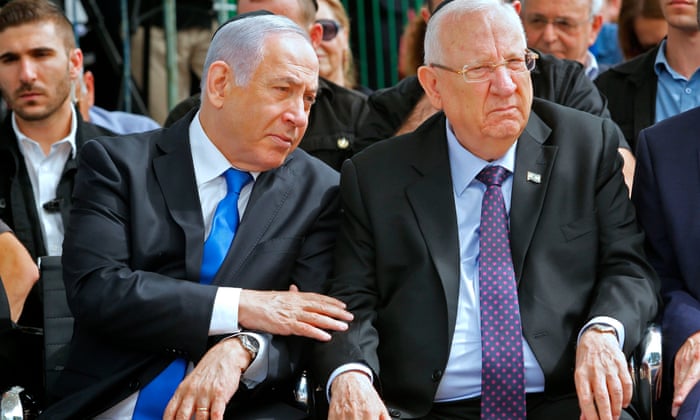The Fruits of Israeli Proportional Representation's Competing, Complex Issues
"These are early days indeed to try to make sense of what government may emerge from the migraine-inducing complexity of Israel’s elections."
" But the outcome everybody professes to want to avoid is already starting to loom in the distance."
"If Netanyahu sees it as his last hope, and Gantz thinks he’ll emerge from it stronger, we may yet have to go through this all again."
David Horovitz, founding editor, Times of Israel
 |
| Israeli Prime Minister Benjamin Netanyahu, left, and President Reuven Rivlin. Photograph: Gil Cohen-Magen/AFP/Getty Images |
That legendary skill, it might now appear, is no longer sufficient to keep him at the helm of government. His rivals feel it's time for him to move on. And those who had formerly supported his ambitions to continue as head of government can no longer be relied upon. He gambled with this second election and he lost. His manic campaigning, his promises, his international alliances that he touted would advantage Israel, his hard line against surrendering territory though popular simply failed to impress the electorate to the extent he anticipated.
Israel, originally conceived and governed as a secular Democratic liberal state under a left-leaning Labour government has become increasingly split between the push and pull of secularism and orthodox Judaism. Mr. Netanyahu's party's reliance on the support of the religious parties has failed to endear him to the greater public in Israel.
Proportional representation in a nation of fractious political parties reflecting Jewish, Arab, Druze, Bedouin, Christian and other elements of the population and their diverse and often opposing values eludes majority governments with all the public confidence and authority available to them throughout their mandate. Israel's is a complex society with nettlesome issues.
No clear election victory for Benjamin Netanyahu the second time around, and this time Likud lost three seats. And the centrist Blue and White party has no interest in propping up a Likud government. The very fact that Blue and White and its leader Benny Ganz gained over Likud's 31 seats, with 33 of the Knesset's 120 seats translates to a new government waiting in the wings. Former military chief Benny Ganz has the support of the Knesset's Arab bloc, another advantage.
"Benny Gantz is not our cup of tea."During the first election in April the Prime Minister was seen to be denigrating the Arab bloc and the voting record of Israeli Palestinians, much less their loyalty to Israel. With good reason in many instances, given both the propensity of some Arab Knesset members to dialogue with Hamas and appear to support their agenda of violence, much less the incidences of Israeli Arab citizens continuing violence against Israeli Jews.
"But we promised our constituents that we would do everything to topple Netanyahu, and the default here is recommending Benny Gantz."
Arab lawmaker Ahmad Tibi
"As we warned, the Arab parties that oppose Israel as a Jewish and democratic state and glorify terrorists recommended Gantz for prime minister", stated Mr. Netanyahu in response.
"If the center-left parties of Israel believe that Arab Palestinian citizens have a place in this country, they must accept that we have a place in its politics."This too is a complicated issue. The State of Israel represents a return to Zion, the heritage geography of Biblical-era-and-beyond Judaism. It was a state meant for a Jewish nation in the realization that nowhere else on Earth could Jews feel free to be themselves. Diaspora Jews have suffered the agony of discrimination and oppression, of violence and of genocide. The re-creation of the State of Israel was meant as a remedy, a place of refuge.
"There is no shared future without the full and equal participation of Arab Palestinian citizens."
Ayman Odeh, leader, Joint List
Despite which, of its nine million population, almost two million are Arab. There is a sizeable African refugee population. There are Copts, Bedouin, Arameans, Circassians, Assyrians, a hodge-podge of ethnic and religious groups. All are citizens, all have the rights of citizenship. As a large minority group, Arabs hold prominent positions of authority in various levels of government, including those elected to parliament. The Jewish state, in other words, is all-inclusive.
Whereas in Arab countries they are excluded. Should a new Palestinian state ever see the light of reality, its leaders have stated unequivocally that no Jews would ever be permitted to live among them. This is the reality of the region that Israel and its Jewish population live with. Walking a fine line, playing a light tune of conciliation and acceptance.
Defending its existence and that of its Jewish population as its reason for existence. Governing such a nation is an uneasy task.
It will be left to Israeli President Reuven Rivlin to determine his choice for prime minister.
Labels: Crisis Management, Israel, Political Realities, Population

<< Home